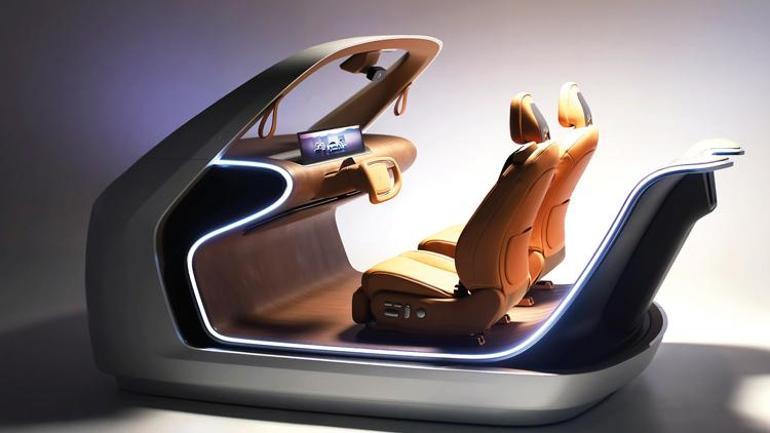Taylan Özgür DİL
Created Date: January 06, 2025 04:00
2025 will be a critical year in which software, artificial intelligence and new generation technologies will be widely used in automotive. Many manufacturers will show their innovations for the first time this year, which will put them one step ahead in high competition. New generation artificial intelligence chips will transform cars into smart devices that can predict and even fix malfunctions. The range of electric vehicles will be 800 km, and budget-friendly electric cars will also become widespread in Turkey. ‘Super hybrid’ technologies will be introduced for drivers who are distant from electric vehicles. Here are the 6 big automotive trends of 2025 selected by Hürriyet:
ARTIFICIAL INTELLIGENCE WILL REPAIR
The introduction of 5G-based internet into automobiles has begun to transform this sector, just like smartphones and computers. In this context, 2025 will be a year when artificial intelligence-based services will begin to be used more in new generation automobiles. Of course, these technologies will not enter automobiles suddenly. Nvidia, one of the world’s largest companies in the field of artificial intelligence chips, will open its doors in the USA this week. CES(Consumer Electronics Fair) will introduce the new chip set that will take artificial intelligence one step further. This technology allows artificial intelligence to automatically process the data it obtains, that is, to put it into practice. For example, if a car using this technology experiences a malfunction in its electronic systems, it will be able to fix it on its own or inform drivers of possible mechanical malfunctions in advance. haber will be able to prevent accidents.
AFFORDABLE ELECTRICS
Despite the contraction in European markets, the growth in electric vehicles is expected to continue in 2025. According to S&P Global Mobility’s forecasts, battery electric vehicle sales in 2025 will increase by 30 percent compared to 2024, reaching 15.1 million units and accounting for 16.7 percent of total sales. In this period when high budgets cannot be allocated to automobiles in the world due to the decline in the prices of the raw materials that make up the battery and the deterioration in the global economy within the scope of the investments of automotive manufacturers, the number of more affordable urban electric cars will increase. Among the options coming to Turkey this year are models such as Citroen eC3, Opel Frontera, Hyundai INSTER, VW ID.3, Renault 5 and Tesla Model Q.
SUPER HYBRID ERA
The number of Plug-in Hybrid (Rechargeable Hybrid) alternatives for users who are distant from electric vehicles is increasing. Normally hybrid engine Although the first manufacturers that come to mind are the Japanese, now more Chinese and European manufacturers have started to develop Plug-in Hybrid cars. The year 2025 will be a year in which the market shares of Plug-in Hybrids will increase both in Europe and Turkey. The fact that the Special Consumption Tax rate on these vehicles in Turkey has dropped to 30 percent also encourages these vehicles. In this context, the number of these cars, which have a battery pack of over 20 kWh and allow a net 100 km of fully electric driving, is expected to increase in 2025. For example, the Mercedes-Benz GLC 350e takes Plug-in Hybrid solutions to the next level with its 24 kWh battery pack, ushering in the “super hybrid” era. Meanwhile, Plug-in Hybrid car sales are expected to reach 9.1 million units by 2030, accounting for 1 in every 4 electric cars.
LEVEL 2 AUTONOMOUS BECOMES THE STANDARD
Driving aids, which were options even in luxury class cars until the pandemic, that is, could be had by paying additional fees, are now expected to be offered as standard in mainstream models in 2025. In particular, Tesla and Chinese manufacturers gave these technologies to consumers as standard, which in a sense forced the Europeans to do this. Research reveals that Level 2 autonomous systems, in which vehicles assist drivers in steering, braking and acceleration, will now be more widely used as standard in cars of the 2025 model year. According to Euromonitor International’s estimate, 48 percent of cars sold in 43 major economies in 2025 will have Level 2 autonomous features. To summarize, the increasingly fierce competitive environment in the automotive industry this year will enable consumers to have more technology for less money.
DRIVER SPECIAL VOICE ASSISTANT
High-resolution screens were among the biggest trends in automobiles last year. This year may be the year of voice assistants that go beyond the existing simple assistants and understand drivers better and make their lives easier. While market forecasts predict that voice assistants will see a significant rise in 2025, brands are also developing their collaborations with technology companies specialized in this field. One of the reasons for the developments here is that there are now too many distracting elements in cars. It is predicted that voice assistants will end all this mess. At this point, ChatGPT, Amazon and Google-based voice assistants are expected to make many controls that drivers normally have to do via buttons or screens in a smarter way.

RANGE WARS
2025 will also be the year of high-range cars rising on new generation electric vehicle infrastructures. Eyes of technology enthusiasts in 2025 Teslawill be transformed into Mercedes-Benz CLA and BMW Neue Klasse. Of course, Chinese manufacturers will also play all their trump cards. For example, BMW’s new Neue Klasse architecture is expected to have 800-volt fast charging capacity and offer a range of more than 800 kilometers. CLA, which will also be built on Mercedes-Benz’s new architecture, is expected to be an efficient electric solution with a range of 750 km. On the Tesla front, it is estimated that the highly anticipated Model Y Juniper will have a long range of over 600 km.
Source: bigpara.hurriyet.com.tr


